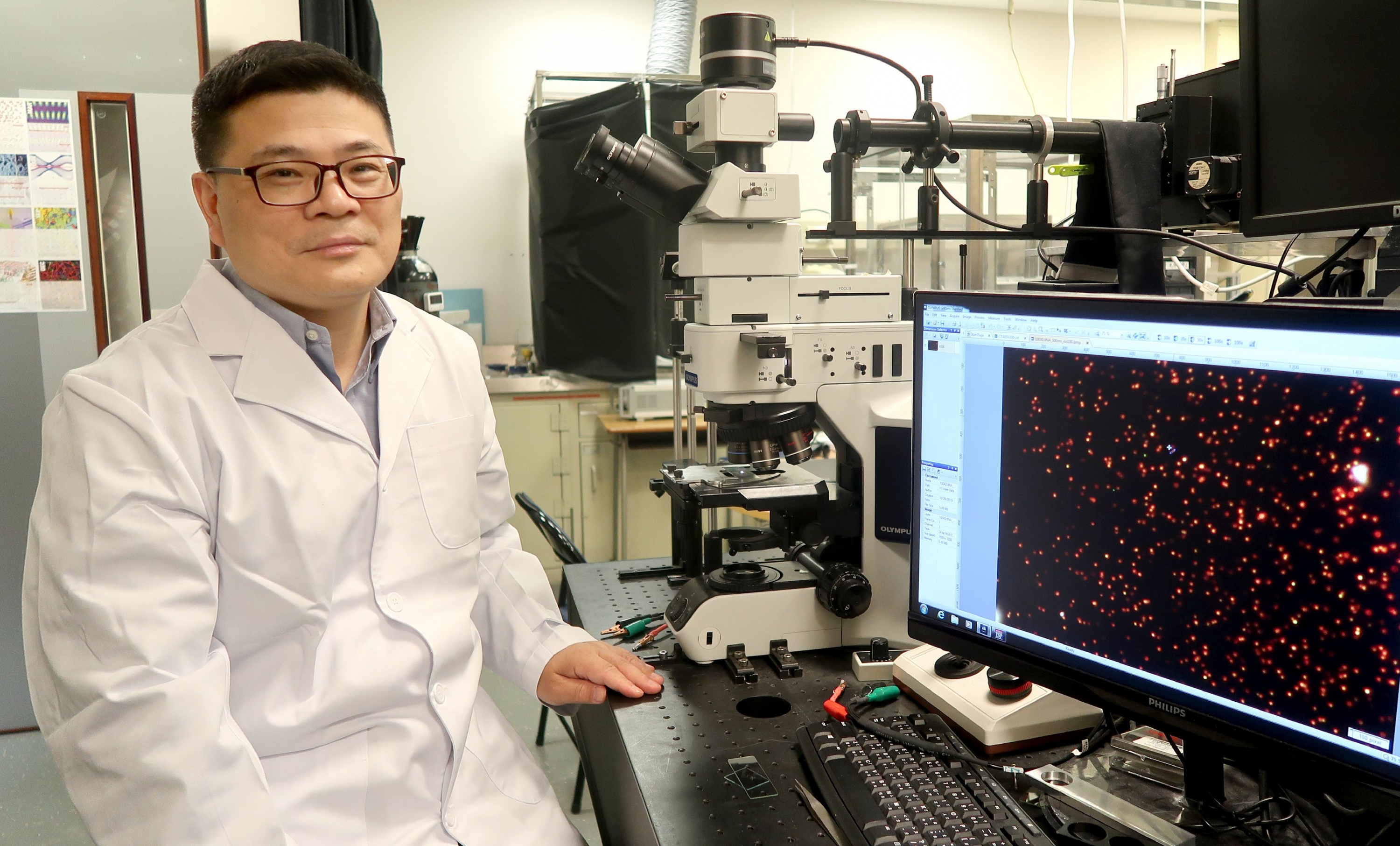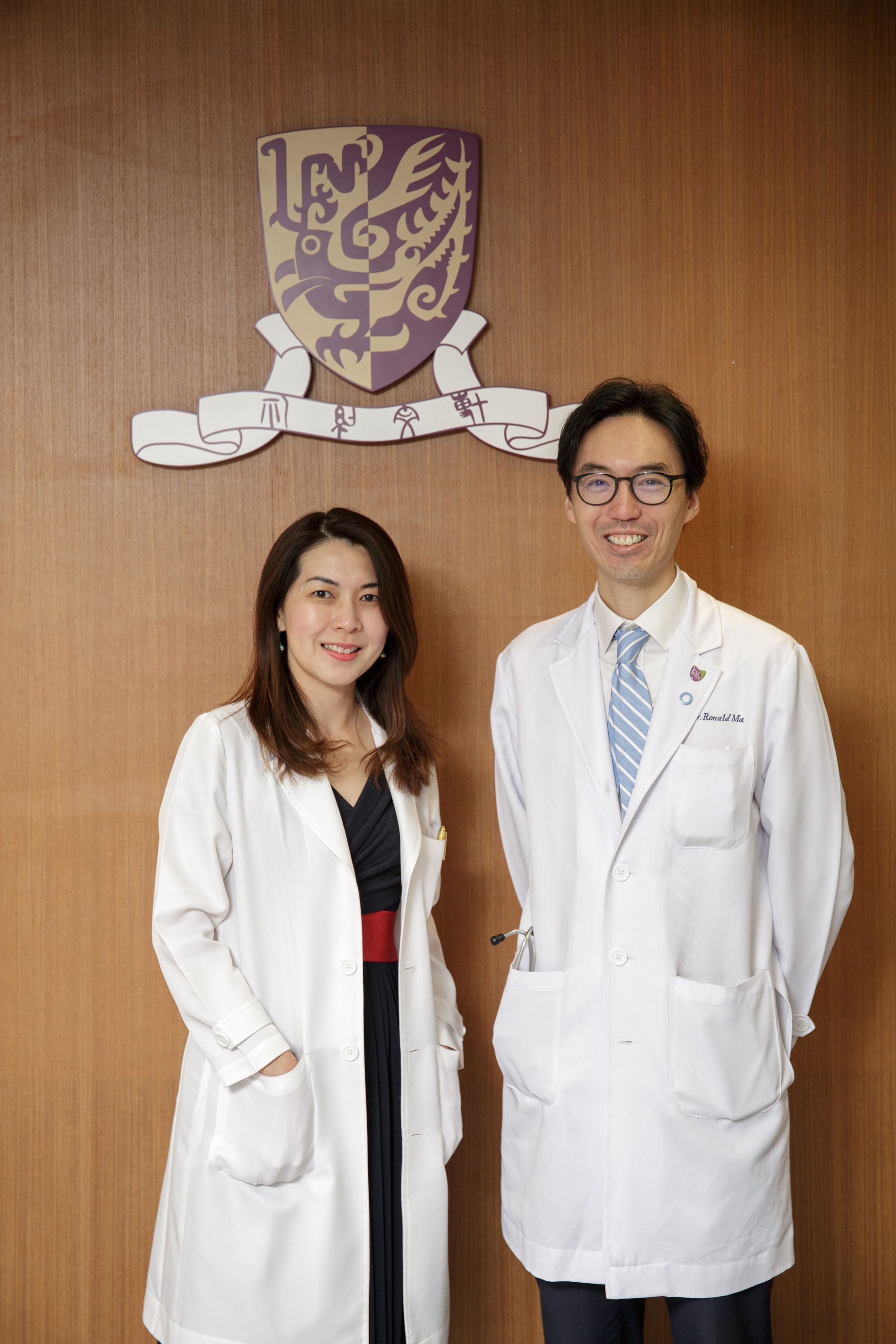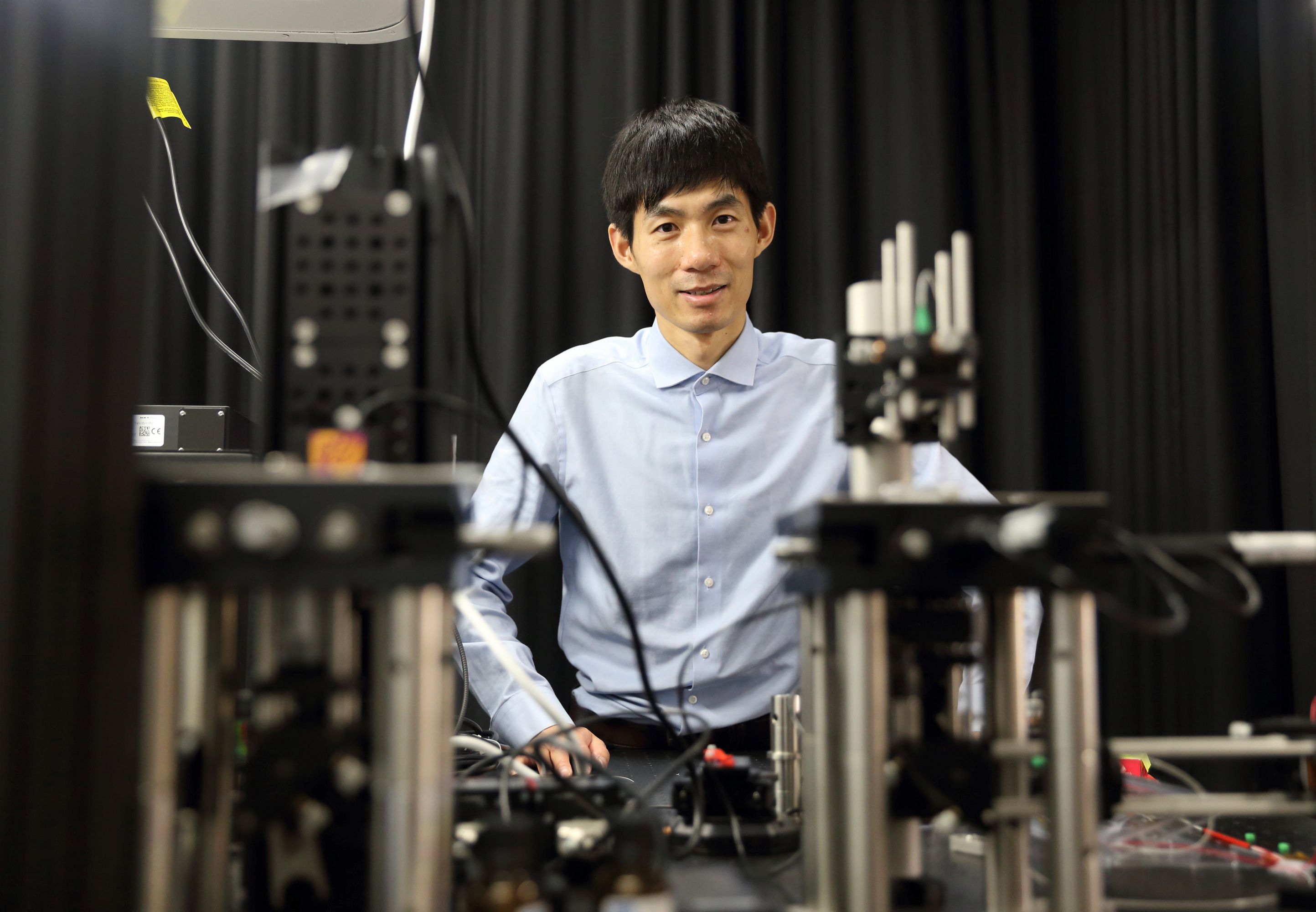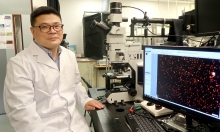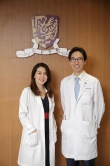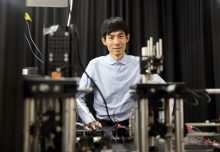CUHK
News Centre
Four CUHK Distinguished Scholars Receive Awards from the Croucher Foundation
Four top research academics from The Chinese University of Hong Kong (CUHK) were presented with prestigious awards from the Croucher Foundation. Professor Jianfang Wang, Professor, Department of Physics received the Croucher Senior Research Fellowship 2020. Two scholars from the Department of Medicine and Therapeutics of the Faculty of Medicine, Professor Ronald Ching Wan Ma, Professor and Head of the Division of Endocrinology and Diabetes, and Professor Siew Chien Ng, Professor, Division of Gastroenterology and Hepatology and Associate Director of the Centre for Gut Microbiota Research were awarded the Croucher Senior Medical Research Fellowships 2020. Professor Renjie Zhou, Assistant Professor, Department of Biomedical Engineering was awarded the Croucher Innovation Award 2019.
Establishing a Reliable Method for the Formation of Plasmonic Nanocavities to Multiply the Detection Sensitivity of Detection Instruments
Joined CUHK in 2005, Professor Jianfang Wang has been intensively exploring various applications based on colloidal plasmonic metal nanocrystals, such as applying plasmonic nanocrystals in colouring, photocatalysis, ultrasensitive sensing, localised photothermal heating, colour switching, smart tags for food products, detection of harmful substances in food and seawater desalination. In his research on smart windows, Professor Wang recently made use of metal-polymer composite materials as glass coating, which can make the glass window frost in a second. In addition, the light transmittance will be adjusted automatically to reduce indoor energy consumption. This technology can also be applied in colour-changing eyeglasses and glass walls in future smart buildings.
Plasmonic nanocavities can increase the intensity of light by more than 10,000 times. They can be applied to spectral detection instruments in different fields such as food, environmental monitoring, medicine, agriculture, multiplying detection sensitivity by more than 100. The nanocavities can be formed by employing molecules as spacers between the plasmonic metal nanocrystals. However, there are great challenges to control the formation of nanocavities with accurate gap distances in a reproducible way.
With support from the Croucher Foundation, Professor Wang will develop robust approaches for the construction of two-dimensional nanosheet-gapped plasmonic nanocavities. Two-dimensional nanosheets, such as the chemical compounds contained in the lubricant for heavy vehicles and industrial equipment, will be used for a more reproducible and efficient fabrication of plasmonic nanocavities. The gap distance will be accurately controlled from one atomic layer to several tens of nanometers. Given its special optical properties, Professor Wang pointed out that these nanocavities can be applied in the future to create a wide range of photonic, electronic and optoelectronic devices for communications and display, as well as visible and infrared high-sensitivity photodetectors. The team will perform optical/electrical measurements and theoretical modeling for a deeper study. It is believed that the research can open the way for the discovery of new optical, electronic and optoelectronic properties and new methods for advanced light emission, modulation and detection.
From excellent research achievements, Professor Wang has obtained a number of awards including the Young Researcher Award from CUHK, the first-class award in Natural Sciences of the Higher Education Outstanding Scientific Research Output Awards from the Ministry of Education, and the Khwarizmi International Award from the Ministry of Science, Research and Technology of Iran.
Establishing Precision Medicine in Diabetes through Genetic Studies
Professor Ronald Ching Wan Ma, who joined CUHK in 2008, is a specialist in endocrinology, diabetes and metabolism. He has been carrying out research on the subject of diabetes and its complications for nearly two decades. His laboratory has utilised several large cohorts, including the Hong Kong Diabetes Register to identify genetic and other novel biomarkers associated with type 2 diabetes and its complications.
With support from the Croucher Foundation, Professor Ma aims to make use of the large multi-omic and clinical dataset generated, as well as the availability of a large prospective cohort for independent validation, to develop clinical tools including polygenic risk scores, for the prediction of diabetes complications and outcome. Professor Ma has published over 280 research articles in international peer-reviewed journals including Nature, The Lancet, The Journal of the American Medical Association (JAMA). He also received a number of awards, including the Ten Outstanding Young Persons Award, Hong Kong and the Albert Renold Fellowship from the European Association for the Study of Diabetes, the Outstanding Fellowship of the Faculty of Medicine from CUHK.
Professor Ma completed his medical training at the University of Cambridge and received training in Internal Medicine in London. Professor Ma subsequently returned to Hong Kong, where he completed his endocrinology fellowship training. Receiving a fellowship from the Croucher Foundation in 2001, he furthered his research interest in the area of diabetic complications and worked as a researcher at the Joslin Diabetes Center, Harvard Medical School.
Elucidating Driver Bacteria in Crohn’s Disease for Therapeutic Manipulation
Professor Siew Chien Ng is a specialist in gastroenterology who joined CUHK in 2010. Her main research interests include the development of microbial diagnostics and innovative applications of microbial medicine for inflammatory bowel disease, obesity and cancer. Her group recently identified a novel putative causative organism to be prevalent in Crohn’s disease patients. With the generous support from the Croucher Foundation, the team will use the existing large repository of biosamples to discover features of the organism that would render it a capable pathogen. The impact of this proposal will open up new avenues for developing preventive, targeted and effective therapeutics via microbial modulation to reduce the burden of Crohn’s disease.
As a world-renowned clinician-scientist, Professor Ng has published around 200 scientific articles in international journals, including Nature Genetics, Nature Communications and The Lancet, and has filed several patents. She is also the pioneer in conducting research on “100K mother-baby cohort” in the Greater Bay Area of China. Professor Ng graduated from St Bartholomew’s and the Royal London School of Medicine and was awarded a Doctor of Philosophy degree from Imperial College London. For her outstanding research achievements, Professor Ng has received many international awards including the Sir David Todd Lectureship, the First-class of Higher Education Outstanding Scientific Research Output Award from the Ministry of Education.
Developing New Tomographic Phase Microscopy (TPM) Technique for In Vivo Imaging
Professor Renjie Zhou’s research focuses on developing high sensitivity interferometric microscopy techniques for biomedical applications. He received his PhD degree in Electrical and Computer Engineering from the University of Illinois at Urbana-Champaign (UIUC), USA in 2014. After that, he was a Postdoctoral Research Associate at G. R. Harrison Spectroscopy Laboratory at Massachusetts Institute of Technology (MIT), where he worked on developing high-speed microscopic imaging techniques. Since joining CUHK in 2017, Professor Zhou has been working closely with medical doctors at Prince of Wales Hospital and Eye Hospital on the medical applications of his TPM technology.
With support from the Croucher Foundation, Professor Zhou will work on developing a new “Reflection-mode TPM for label-free in vivo imaging applications using light diffraction and coherence properties”, to make new breakthroughs and further applications in in vivo imaging technology. Given its non-invasive nature, the new TPM based scanning can be performed frequently over time and the team is also expecting to achieve real-time tracking of tiny living cells and tissues, which in turn can help medical professionals to make better diagnosis at an early stage to prevent tumour formation.
Professor Zhou has over 30 papers published in well-known international journals, including Nature Photonics and Physical Review Letters. He also served as a reviewer for around 30 international journals. Professor Zhou has also received many research awards and fellowships including Beckman Graduate Fellowship from the Arnold and Mabel Beckman Foundation.
The Croucher Innovation Awards
First presented in 2012, the Croucher Innovation Awards aim to identify a small number of exceptionally talented scientists working at an internationally competitive level and to offer substantial support to these “rising stars” at a formative stage in their careers. The Awards are designed to enable recipients to pursue their own scientific, intellectual and professional inclinations, to advance their expertise, to engage in bold new work, and to contribute to the development of education and research in Hong Kong. Each award carries a value of up to HK$5 million over 5 years for research expenses of the award winner.
The Croucher Senior Research Fellowships / Croucher Senior Medical Research Fellowships
The Croucher Senior Research Fellowships scheme was first introduced in 1997. The Fellowships are awarded to local academics who have excelled in scientific research work, while the Croucher Senior Medical Research Fellowships are conferred on outstanding scientists employed on clinical teachers’ terms in medicine and dentistry. The awards are judged by a group of leading international scientists invited to provide confidential reviews of candidates nominated in a competitive exercise. The value of each award includes a HK$2 million research grant to the award winner. Separate funds are awarded to the universities of the fellowship recipients, enabling the university to recruit replacement teacher/clinical medical staff to take over the award winner’s duties for a twelve-month period.
Professor Ronald Ching Wan Ma (right), Professor and Head of Division of Endocrinology and Diabetes, Department of Medicine and Therapeutics, Faculty of Medicine, and Professor Siew Chien Ng (left), Professor, Division of Gastroenterology and Hepatology, Department of Medicine and Therapeutics, Faculty of Medicine, CUHK


